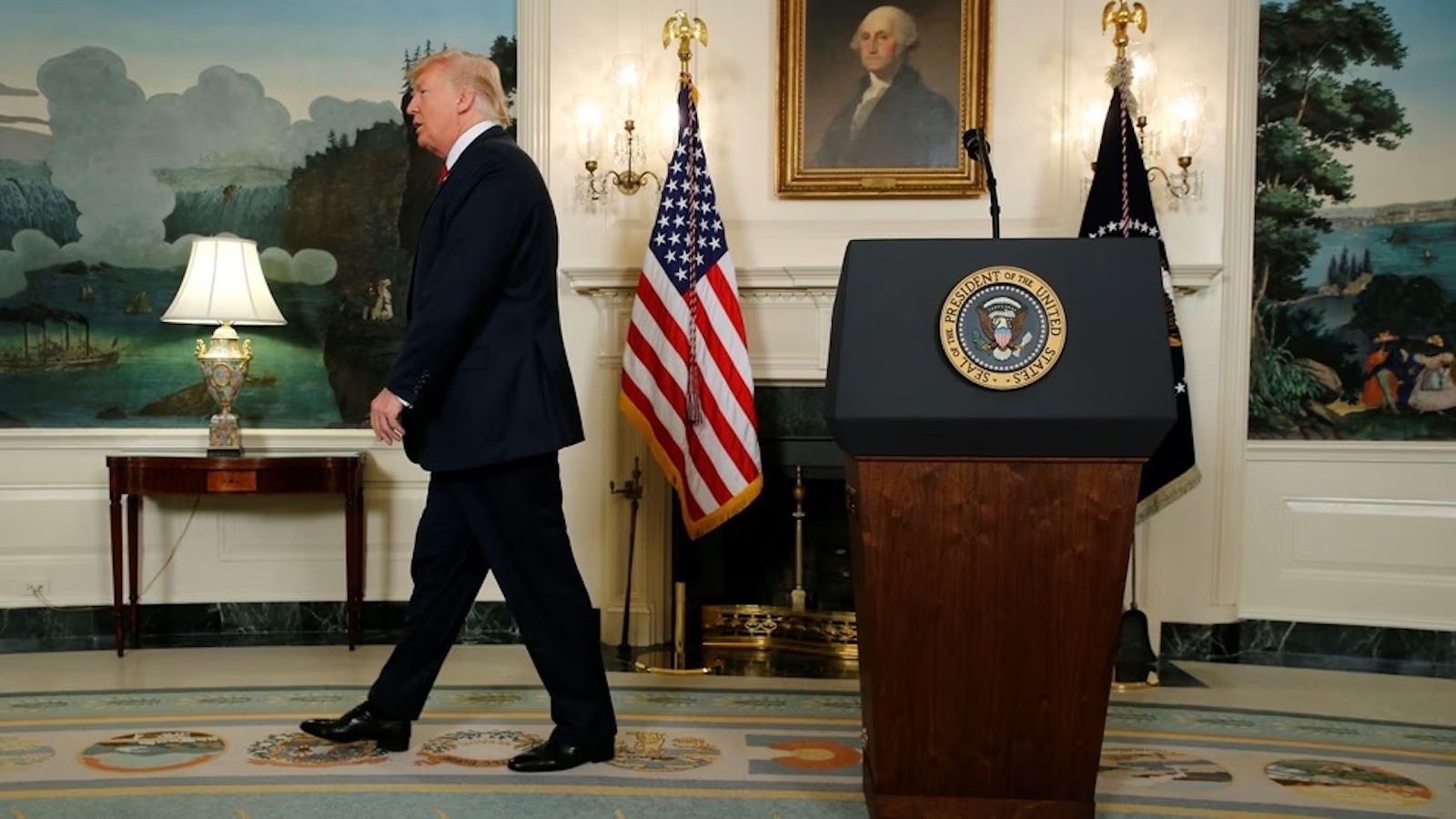
“War”—The Magic Word that Justifies Anything
Following Donald Trump’s election in 2016, I read a fascinating book called The King in Orange, exploring the magical and occult forces that swept the 45th president into office against all odds and expectations. I suspect many readers are already scoffing at what to them must seem a ludicrous premise full of woo-woo and superstitious hoo-hah, but I would argue that the world of politics relies more heavily on things like spells, incantations, and mass hypnosis than just about any other facet of modern life. An example of this is how certain words come to take on a mystical significance that allows them not only to communicate ideas, but to alter the fabric of reality itself. One such word is “war.”
For the past week or so, much of our nation’s political discussion has centered around two issues: the bombing of the Houthis in Yemen and ICE’s detention and deportation of students accused of supporting the terrorist organization Hamas. From a libertarian perspective, there are good objections to both these policies. Trump was elected largely on a platform of America First, meaning no more Middle East interventionism and endless foreign wars, among other things. The latest strikes in Yemen have targeted buildings in residential neighborhoods and have killed more than fifty people so far, including children and other civilians.
Now, call me old fashioned, but I still think that the deliberate targeting of civilians, raining down death and destruction on women and children who have nothing to do with any shipping disputes, is pretty evil. When that kind of thing happens on American soil, we use words like “murder” and “terrorism” to describe such acts. But today, when I or other libertarians voice these concerns, they are invariably met with a dismissive sneer from Trump loyalists who refuse to acknowledge any wrongdoing on the part of their fearless leader. “It’s war,” they tell me. “People die in war. Get over it.”
It's called collateral damage. War is hell.
— AvoidTheVoid (@AvoidTheeVoid) March 28, 2025
Yes it would be valid as an act of war if you can kill the enemy you do it. Did you think firebombing Dresden or Tokyo was only getting soilders? War isn't a game last I checked.
— WhiskeyJack (@AnasurimborKell) March 28, 2025
How can you be a grown up man and still be surprised about how war works
— Bag Holder (@Btico19) March 28, 2025
I suppose the most obvious retort to this kind of talk is that the government’s military action in Yemen is not war. Wars have to be declared by Congress, pursuant to Article I of the United States Constitution. Since no such declaration has been made, then unilateral executive action to bomb buildings overseas does not meet the legal definition of a war. I can understand, however, how this could be considered needless pedantry on my part. After all, Congress has not formally declared a war since the 1940s, instead preferring to rely on more nebulous Authorizations for the Use of Military Force for military conflicts in Iraq, Afghanistan, and elsewhere.
But even supposing I grant the premise that we are at war with Yemen, what then? Do the rules of morality, of decency, of humanity, no longer apply? Does using the word “war” somehow change the killing of children from an unforgivable criminal act into an acceptable means of achieving a military end? It would appear that, at least in the minds of many Americans, this is indeed the case. And if uttering a single word can miraculously render an otherwise criminal act morally justified, that must make “war” the most potent magical incantation since “abracadabra.”
Similarly, many libertarians are troubled by the lack of due process in the recent wave of deportations targeting immigrants who have expressed views critical of Israel and its treatment of Gaza. Rumeysa Ozturk, a 30-year old Ph.D. student living in the U.S. legally, was picked up by plainclothes policemen, her visa status revoked, and is currently being detained in an ICE facility in Louisiana. She has not been charged with any crime, and while Secretary of State Marco Rubio claims she has been involved with disruptive activity in support of Hamas terrorists, without any kind of due process no evidence has been presented to support these allegations. All we know for sure is that she wrote an op-ed critical of the Israeli government, an activity apparently no longer protected under the First Amendment. This comes shortly after the deportation of Columbia University graduate Mahmoud Khalil for similarly unproven accusations of terrorist sympathies.
Of course, no sensible person would oppose removing violent terrorists from our country, but without due process there is no way to actually know whether any of these people have actually done what they are being accused of. They might be bad people, as Rubio claims, but as long as the government is allowed to simply make people disappear at will, we’ll never know. What’s more, there’s no limiting principle that would prevent Rubio or other government officials from using the same tactics on any immigrant. If an accusation without evidence is enough to justify deportation, then no one is safe, and I for one don’t trust the Feds to always tell the truth, the whole truth and nothing but the truth.
Here again, however, when libertarians make this point they are met with indignant cries of “there’s no time for due process when we’re at war!” It’s unclear what war people who make this sort of claim are referring to. Some seem to be under the impression that we are at war with Hamas, making the all too common mistake of confusing the American and Israeli governments as a single entity. Others try to frame immigration itself (both legal and illegal) as an “invasion,” employing military language as an attempt to justify drastic action. Then again, maybe this is all part of the vaguely-defined War on Terror that the U.S. has apparently been fighting since 2001. Is that still going on? Is there any way to tell?
Flexing its supernatural abilities again, the word “war” has magically made one of the most cherished American rights go poof! It has also made a worrying number of “rule of law” conservatives comfortable with unilateral action by federal agents to detain, indefinitely hold, and eventually deport legal residents without demonstrating any kind of wrongdoing whatsoever.
We’ve spent the last 4 years talking about what was seen as a literal invasion. Literally, not figuratively. Due process does not apply. This is not Law & Order. This is War.
— Sonza the Gnome (@Sonza_the_Gnome) March 28, 2025
Perhaps this ability to suspend morality, the law, and even the Constitution is why the term “war” is so frequently employed by presidents eager to expand their powers. LBJ had the War on Poverty and the War on Crime, Richard Nixon started the War on Drugs, and of course George W. Bush gave us the War on Terror. These wars are convenient because they require no formal declarations, have no victory conditions, and can go on indefinitely all while providing a rationalization for any number of deplorable and extra-constitutional actions.
In reality, however, just calling something a war doesn’t change anything. This is evident if we try to apply the standards government sets for itself to individual actions. If I declare war on my neighbors, that doesn’t give me the right to blow up their house or kill their children. The excuse “but it was war” would go no further in a court of law than when delusional people try to claim sovereign citizenship in order to avoid paying taxes. That’s because we all recognize, even if we pretend not to, that inflicting death and destruction on others is wrong, no matter what label we apply to it.
“War” is not actually a magic word, and employing it has no real effect on the rights and wrongs of any given situation. What it does have, however, is the ability to hypnotize voters into no longer caring about the lives or basic rights of their fellow human beings.
Free the People publishes opinion-based articles from contributing writers. The opinions and ideas expressed do not always reflect the opinions and ideas that Free the People endorses. We believe in free speech, and in providing a platform for open dialogue. Feel free to leave a comment.



